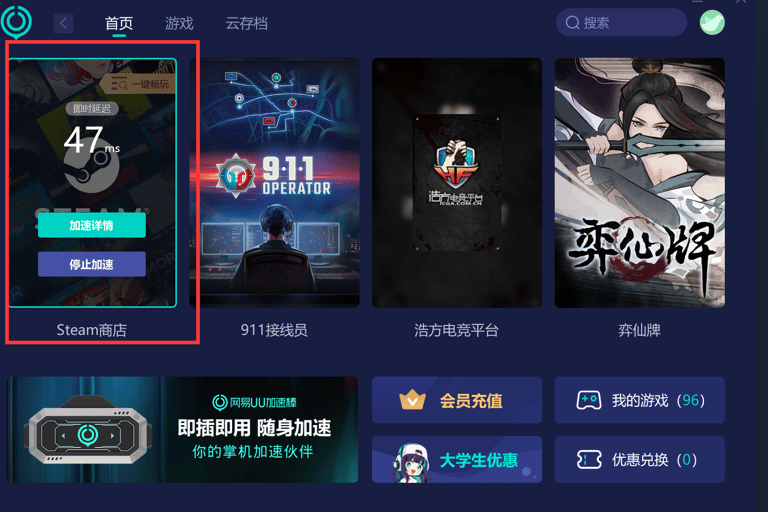chinese market
Learn how to market your indie game in china, what law you need to obey and how to collaborate with press and influencers and start selling your videogame in China , chinese market
GAMINGSTEAMINDIE GAMECHINA


Regarding the Chinese replacements for the international platforms, we can have the following:
Facebook: WeChat Moment
Youtube: Bilibili
Whatsapp/telegram: Wechat
Discord: QQ
Twitter: Weibo
Reddit: Baidu Tieba
Twitch: Douyu/Huya/Bilibili
Instagram: Xiaohongshu
So, Steam is something like a grey market in China,and the Chinese government is opening one eye and closing another eye on it Almost no Chinese players are playing PC singleplayer games on Wegame, the players using Wegame are just those playing Tencent's online games, like League of Legends
The games on Wegame, need a license. Besides Steam, there is also a PC game platform, called Wegame, by Tencent https://www.wegame.com.cn/home/ like the one that I am using, every day When I open the computer, I will open it
There is a Chinese version of Steam, the Chinese publisher is Perfect World, but no Chinese player is using it


All of international social, messaging apps, software, and platforms are blocked in China, including but not limited to Whatsapp,Instagram,telegram,Youtube,Twitter,Facebook,Linkedin,Discord,Reddit,all Google's products and services,Dropbox,Twitch...,and only Skype is free to use in China.
We can use VPN to connect to these blocked platforms,but VPN is also something that the Chinese government is increasing efforts to crack down on these years...
It seems that by the Chinese regulations and laws,the people found using VPN secretly will be fined under 15,000 Chinese RMB, but for the people around me who have used it , including me, nobody have been found and fined so far.
In terms of the game platforms, the international version of Steam could be used in China but we need to use an accelerator, which is not a difficult thing to do.
The console had been forbidden in China for 20+ years and just got restored a couple of years
The Chinese video game market is one of the largest and most lucrative in the world. In 2024, the market is projected to generate around $94.49 billion in revenue https://www.statista.com/outlook/dmo/digital-media/video-games/china. This market is expected to grow at a compound annual growth rate (CAGR) of 8.11% from 2024 to 2027 https://www.statista.com/outlook/dmo/digital-media/video-games/china.
Platforms for Selling Games in China
Developers sell their games on various platforms in China, including:
Mobile Platforms: Mobile gaming is the largest segment, with platforms like Tencent's WeChat, QQ, and various app stores such as Huawei AppGallery and Xiaomi App Store https://www.localizedirect.com/posts/how-to-publish-games-in-china/.
PC Platforms: Steam China is a major platform for PC games, with a significant portion of Chinese gamers using it https://gameworldobserver.com/2024/07/04/pc-gamers-china-steam-spending-niko-partners.
Console Platforms: Although console gaming is less dominant, platforms like PlayStation and Xbox are available, but they require specific approval https://www.globaldata.com/data-insights/technology--media-and-telecom/market-size-of-video-gaming-in-china/.
Requirements for Foreign Developers
To sell games in China as a foreign developer, you need to navigate several regulatory requirements:
Local Business Entity: You must partner with a local Chinese publisher, as foreign companies cannot directly publish games in China https://www.localizedirect.com/posts/how-to-publish-games-in-china/.
Licenses and Approvals: Obtain an ISBN (International Standard Book Number) from the National Press and Publication Administration (NPPA). This process involves submitting the entire game script and other content for review https://www.ptw.com/lab/article-gateway-to-china.
Compliance with Regulations: Your game must comply with Chinese laws, including content restrictions (e.g., no blood or dead bodies) and embedding an anti-addiction system https://www.ptw.com/lab/article-gateway-to-china.
Copyright Registration: Register your game with the National Copyright Administration of China https://www.nativex.com/en/blog/staying-compliant-chinas-gaming-regulations-explained/.
Navigating these requirements can be complex, but partnering with a local publisher can help streamline the process and ensure compliance with all regulations. Streaming Platforms for Video Games in China
China has a vibrant ecosystem for video game streaming, with several major platforms dominating the market:
Huya Live: One of the largest live streaming services in China, focusing primarily on video game live streaming and esports competitions https://en.wikipedia.org/wiki/Huya_Live.
Douyu: Another major player in the live streaming market, Douyu offers a wide range of gaming content and has a significant user base https://radii.co/article/china-livestreaming-gaming-huya-douyu-tencent.
Bilibili: Known for its diverse content, Bilibili also hosts a large amount of gaming and esports streams https://www.statista.com/statistics/868910/china-game-video-streaming-platforms-revenue/.
Social Media Platforms Used by Gamers in China
WeChat: The most popular messaging app in China, used for a variety of purposes including gaming communities and updates https://www.statista.com/statistics/250546/leading-social-network-sites-in-china/.
Douyin: The Chinese version of TikTok, popular for sharing short gaming videos and live streams https://www.statista.com/statistics/250546/leading-social-network-sites-in-china/.
Weibo: A microblogging platform similar to Twitter, where gamers and developers share news and updates https://www.statista.com/statistics/250546/leading-social-network-sites-in-china/.
Xiaohongshu (Little Red Book): A social commerce platform where users share reviews and recommendations, including for games https://www.statista.com/statistics/250546/leading-social-network-sites-in-china/.
QQ: An instant messaging service that also supports gaming communities https://www.statista.com/statistics/250546/leading-social-network-sites-in-china/.
Forums for Game Developers and Gamers
There are several forums and communities where game developers and gamers in China interact:
Baidu Tieba: A popular forum platform where users create and participate in discussions on various topics, including gaming https://china-digital.com/blogs/chinese-social-networks/.
Zhihu: A Q&A platform similar to Quora, where developers and gamers can ask questions and share knowledge https://china-digital.com/blogs/chinese-social-networks/.
Douban: A social networking service that includes groups and discussions on gaming https://china-digital.com/blogs/chinese-social-networks/.
Reddit's r/gamedev: While not specific to China, this subreddit has discussions and guides relevant to entering the Chinese market
https://www.reddit.com/r/gamedev/comments/dq53gd/the_indie_devs_guide_to_the_chinese_market/.
These platforms and forums provide a rich environment for both gamers and developers to connect, share information, and stay updated on the latest trends in the gaming industry.
Nimo TV allows gamers to stream their gameplay, interact with their audience in real time, and participate in various community events. It supports both mobile and PC streaming, making it accessible to a wide range of users https://www.nimo.tv/.Nimo TV is the global version of the Chinese streaming platform Huya Live
https://en.wikipedia.org/wiki/Huya_Live. It focuses primarily on video game live streaming and esports tournaments, but it also includes other categories like "Just Chatting" and live shows https://streamscharts.com/news/nimo-tv-overview.
Nimo TV is popular in several countries outside China, including Brazil, Indonesia, and Vietnam. investors and venture capital firms are actively investing in the Chinese video game industry. Here are some of the key players:
Major Investors
Tencent: One of the largest gaming companies globally, Tencent has invested in numerous gaming companies, including Ubisoft, Activision Blizzard, and Epic Games https://www.pcgamer.com/these-are-the-31-gaming-companies-tencent-invested-in-last-year/.
NetEase: Another major player, NetEase has also made significant investments in both domestic and international gaming companies https://kinacentrum.se/en/publications/chinese-game-changers-potential-risks-associated-with-chinese-investments-in-the-global-video-game-industry/.
IDG Capital: This investment firm funds early- to growth-stage companies in the technology sector, including video games https://shizune.co/investors/video-games-investors-china.
Galaxy Interactive: Known for investing in interactive content and technology, including gaming https://shizune.co/investors/video-games-investors-china.
Sinovation Ventures: A venture capital firm that invests in technology and innovation, including gaming startups https://shizune.co/investors/video-games-investors-china.
Other Notable Investors
Source Code Capital
Joy Capital
Northern Light Venture Capital
Vertex Ventures China
Kleiner Perkins
These investors provide crucial funding and support to gaming startups and established companies, helping to drive innovation and growth in the industry. specialize in early-stage investments. Here are a few notable ones:
Thrive Capital: Based in New York, Thrive Capital focuses on internet, software, and technology startups. They have invested in companies like Stripe and Nourish https://startupsavant.com/top-venture-capital-firms/early-stage.
Omega Funds: Located in Boston, Omega Funds invests in biotech and technology sectors. They support companies from inception to commercialization https://startupsavant.com/top-venture-capital-firms/early-stage.
Ribbit Capital: This Silicon Valley firm specializes in fintech and has backed companies like Affirm and Groww https://startupsavant.com/top-venture-capital-firms/early-stage.
Antler: A global early-stage venture capital firm that invests in pre-seed and seed rounds. They have a presence in multiple countries and support a wide range of industries https://www.crunchbase.com/hub/early-stage-venture-investors.
Seedcamp: Based in Europe, Seedcamp invests in early-stage startups across various sectors, providing both funding and mentorship https://www.crunchbase.com/hub/early-stage-venture-investors.
If you're looking for more options, platforms like Crunchbase and AngelList can help you find investors that match your specific needs and industry focus https://www.crunchbase.com/hub/early-stage-venture-investors.
Game publishers in China. Here are some of the key players:
Major Game Publishers in China
Tencent Games: One of the largest and most influential game publishers globally, known for titles like Honor of Kings and PUBG Mobile https://gamecompanies.com/game-publishing/china.
NetEase Games: Another major publisher, responsible for popular games such as Fantasy Westward Journey and Identity V https://gamecompanies.com/game-publishing/china.
MiHoYo: Known for the globally successful game Genshin Impact https://en.wikipedia.org/wiki/Category:Video_game_companies_of_China.
Perfect World: Publishes a variety of MMORPGs and other online games https://en.wikipedia.org/wiki/Category:Video_game_companies_of_China.
Shanda Games: Focuses on online games and mobile games https://en.wikipedia.org/wiki/Category:Video_game_companies_of_China.
Kingsoft: Known for games like JX Online https://gamecompanies.com/game-publishing/china.
Oasis Games: Publishes a wide range of games, including mobile and VR titles https://gamecompanies.com/game-publishing/china.
Coconut Island Games: Focuses on indie games and has published several successful titles https://gamecompanies.com/game-publishing/china.
WhisperGames: Specializes in localizing and publishing indie games https://gamecompanies.com/game-publishing/china.
Snail Digital: Known for games like Age of Wushu https://gamecompanies.com/game-publishing/china.
These publishers play a significant role in the Chinese gaming market, supporting both domestic and international game developers. Here are some popular game news media outlets in China that are similar to IGN in the US:
Popular Game News Media Outlets in China
17173: One of the oldest and most comprehensive gaming news websites in China, covering a wide range of games and industry news https://www.scmp.com/topics/video-gaming.
GamerSky (游民星空): A well-known site for game reviews, news, and guides https://www.scmp.com/topics/video-gaming.
GCORE (机核): Focuses on in-depth articles, reviews, and podcasts about games and gaming culture https://www.reddit.com/r/ChineseLanguage/comments/puln27/popular_chinese_media_outlets_for_gaming_news/.
TGBus (电玩巴士): Provides news, reviews, and forums for gamers https://www.scmp.com/topics/video-gaming.
Bilibili: While primarily a video-sharing platform, Bilibili also has a significant amount of gaming content, including news and reviews http://www.chinadaily.com.cn/a/202308/10/WS64d431d0a31035260b81b453.html.
WeGame: Tencent's gaming platform that also features news and updates about games https://www.scmp.com/topics/video-gaming.
These outlets provide a variety of content, from news and reviews to in-depth articles and community discussions, catering to the diverse interests of Chinese gamers. G
Baidu Tieba: This is a popular forum platform with various sub-forums dedicated to different consoles, including Xbox and PlayStation https://www.reddit.com/r/AskAChinese/comments/svta04/is_there_an_international_forum_or_website/.
NGA (National Game Association): A well-known gaming forum in China that covers a wide range of topics, including console gaming
https://www.reddit.com/r/AskAChinese/comments/svta04/is_there_an_international_forum_or_website/.
WeGame: Tencent's gaming platform also has community features where gamers can discuss console games https://www.installbaseforum.com/forums/.
Zhihu: While primarily a Q&A platform, Zhihu has many discussions and communities related to console gaming https://www.reddit.com/r/AskAChinese/comments/svta04/is_there_an_international_forum_or_website/.
The Chinese government does provide support and grants for the video game industry, although these are often part of broader initiatives to promote technology and innovation. Here are some key points:
Government Support and Grants
Cultural Industry Development Fund: This fund supports various cultural projects, including video games, to promote cultural and creative industries https://www.cnbc.com/2022/12/29/china-to-import-45-foreign-video-games-grants-multiple-licenses-to-tencent.html.
High-Tech Enterprise Status: Companies that achieve this status can receive tax benefits and other financial incentives. Video game companies focusing on technological innovation can apply for this status https://www.scmp.com/tech/policy/article/3204844/china-gaming-ban-beijing-issues-licences-44-imported-games-first-time-18-months-approvals-tencent.
Local Government Grants: Various local governments in China offer grants and subsidies to support the development of the gaming industry within their regions https://www.scmp.com/tech/policy/article/3204844/china-gaming-ban-beijing-issues-licences-44-imported-games-first-time-18-months-approvals-tencent.
Regulatory Approvals
In addition to financial support, the Chinese government also regulates the industry through the National Press and Publication Administration (NPPA). Obtaining an ISBN (International Standard Book Number) and other necessary approvals is crucial for both domestic and foreign game developers
Incubators and accelerators in China that support game developers. Here are some notable ones:
Game-Specific Incubators and Accelerators
GameFounders: A global game accelerator that supports game studios with mentoring, networking, and funding opportunities https://www.gamefounders.com/.
Chinaccelerator: While not exclusively for games, this accelerator helps tech startups, including game developers, to scale their businesses https://www.failory.com/startups/china-accelerators-incubators.
General Tech Incubators and Accelerators
Lenovo Capital and Incubator Group: Focuses on high-tech startups, including those in the gaming industry https://www.failory.com/startups/china-accelerators-incubators.
Sinovation Ventures: An incubator that invests in technology startups, including game developers https://globig.co/blog/top-accelerators-and-incubators-in-china/.
Microsoft Accelerator Beijing: Offers a program for later-stage startups looking to scale, including those in the gaming sector https://globig.co/blog/top-accelerators-and-incubators-in-china/.
These programs provide valuable resources such as mentorship, office space, networking opportunities, and sometimes funding to help game developers grow and succeed. To successfully launch and stand out in the Chinese video game market, you'll need to focus on several key areas:
Localization
Language: Translate your game into Simplified Chinese. Ensure high-quality localization to make the game feel native to Chinese players https://www.localizedirect.com/posts/chinese-game-localization-factsheet/.
Culturalization: Adapt cultural references, themes, and content to align with Chinese cultural norms and preferences https://digital-trans.asia/en/news-and-blogs/post/rise-translation-and-game-localization-chinese-gaming-industries. This includes modifying characters, storylines, and even game mechanics to resonate with local players.
Regulatory Compliance
ISBN and Approvals: Obtain an ISBN from the National Press and Publication Administration (NPPA). This involves submitting your game for content review and approval https://sekkeidigitalgroup.com/how-to-break-into-china-gaming-market/.
Content Restrictions: Ensure your game complies with Chinese regulations, such as avoiding depictions of blood, gore, and politically sensitive content
https://www.localizedirect.com/posts/chinese-game-localization-factsheet/.
Partner with a Local Publisher
Local Expertise: Partnering with a local publisher can help navigate regulatory requirements and provide insights into the local market https://sekkeidigitalgroup.com/how-to-break-into-china-gaming-market/.
Distribution Channels: Local publishers can also help distribute your game on popular platforms like Tencent's WeChat, QQ, and various app stores https://sekkeidigitalgroup.com/how-to-break-into-china-gaming-market/.
Marketing Strategies
Social Media: Utilize popular Chinese social media platforms like WeChat, Weibo, Douyin (TikTok), and Bilibili for marketing campaigns https://sekkeidigitalgroup.com/how-to-break-into-china-gaming-market/.
Influencer Marketing: Collaborate with local influencers and streamers to promote your game. Platforms like Huya and Douyu are popular for game streaming https://sekkeidigitalgroup.com/how-to-break-into-china-gaming-market/.
Pre-registration Campaigns: Launch pre-registration campaigns to build hype and gather a player base before the official release https://sekkeidigitalgroup.com/how-to-break-into-china-gaming-market/.
Community Engagement
Forums and Communities: Engage with gamers on local forums like Baidu Tieba and NGA. Participate in discussions and gather feedback to improve your game https://sekkeidigitalgroup.com/how-to-break-into-china-gaming-market/.
Customer Support: Provide robust customer support in Chinese to address player concerns and enhance their gaming experience https://sekkeidigitalgroup.com/how-to-break-into-china-gaming-market/.
Continuous Updates and Events
Regular Updates: Keep the game fresh with regular updates, new content, and events tailored to Chinese players https://sekkeidigitalgroup.com/how-to-break-into-china-gaming-market/.
In-Game Events: Host special in-game events during Chinese holidays and festivals to engage players and boost retention https://sekkeidigitalgroup.com/how-to-break-into-china-gaming-market/.
To publish games on Bilibili as a game developer, the primary self-service option is through their Mini-Games (小游戏) platform, which allows lightweight, no-install games to run directly in the Bilibili app.https://miniapp.bilibili.com/small-game-doc/guide/intro/
These are H5/WebGL-based games accessible via the game center, search, shares, or feeds. Benefits include cloud hosting, seamless app integration, and access to Bilibili's ACG-focused audience (anime, comics, games). Supported engines: Cocos Creator, LayaBox, Egret, Unity (with adaptations).
Key Limitation: Enterprise-Only RegistrationMini-Games access is currently restricted to enterprise developers ("仅对企业开发者开放注册"). Individuals cannot register directly.
https://miniapp.bilibili.com/small-game-doc/source/manager
https://miniapp.bilibili.com/small-game-doc/guide/account
You'll need a Chinese business entity/license for approval. Foreign devs may need a local partner. Co-publisher/co-founder
Steps to Publish Mini-Games (Enterprises Only)Register as Developer:Visit the Bilibili Game Open Platform backend.
Go to registration (e.g., #/register/choose-type).
https://open.biligame.com/#/register/choose-type
Submit enterprise details (business license, etc.). Approval takes days; get appId, UID, and secret_key even pre-approval for dev.
https://help.solar-engine.com/cn/docs/bilibili-xiao-you-xi-SDK
https://miniapp.bilibili.com/small-game-doc/guide/account
Add team accounts: In backend, assign developer (upload perms) and preview (QR scan) roles (up to 50 users).
Prepare Development:Set domain whitelist and server domains (e.g., for analytics) in backend.
Download tools: IDE (Node >=18) from docs or CLI (npm install bili-sgame-cli -g v2.0+).
https://miniapp.bilibili.com/small-game-doc/guide/publish
Update game.json with your appId.
Develop & Test Locally:
Build/export game in chosen engine. Adjust folder structure/config. Add required start埋点 (analytics). Debug via tools/QR preview.Upload & Publish:
Upload package via IDE/CLI to create dev version. Preview on real devices via backend QR. Submit dev version for review (content, compliance check).Post-approval: Game goes live in Bilibili app.
https://miniapp.bilibili.com/small-game-doc/guide/publish
https://miniapp.bilibili.com/small-game-doc/guide/intro/
Tips: Use backend APIs for login, data, etc. Comply with Chinese regs (no illegal content). Monetize via ads/IAP.
https://miniapp.bilibili.com/small-game-doc/server-ability/backend-api
For Full Games (Mobile/PC) or Indies self-publishing: Bilibili Games (biligames.com) is their publishing arm for larger titles (e.g., ACG mobile games like Azur Lane).
https://store.steampowered.com/publisher/bilibili
https://store.steampowered.com/publisher/bilibili
Contact: Reach out via events (ChinaJoy, Bilibili World), email (from protocol), or their Steam page. Provide demo, pitch.
Foreign/indie challenges:
Need ISBN license for monetization; partner with local publisher.
https://www.localizedirect.com/posts/how-to-publish-games-in-china
Create Bilibili UP主 account: Upload trailers, devlogs, gameplay (huge for Steam sales).
a game dev story on reddit:
https://www.reddit.com/r/gamedev/comments/1n3eljp/marketing_your_game_to_chinese_players_a_guide/
Link to Steam/TapTap (Bilibili invested in TapTap for indies).
